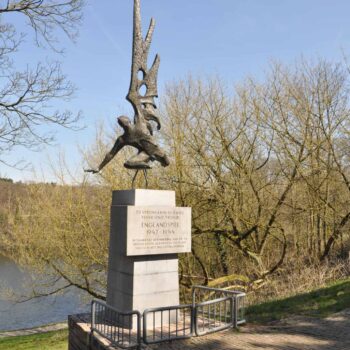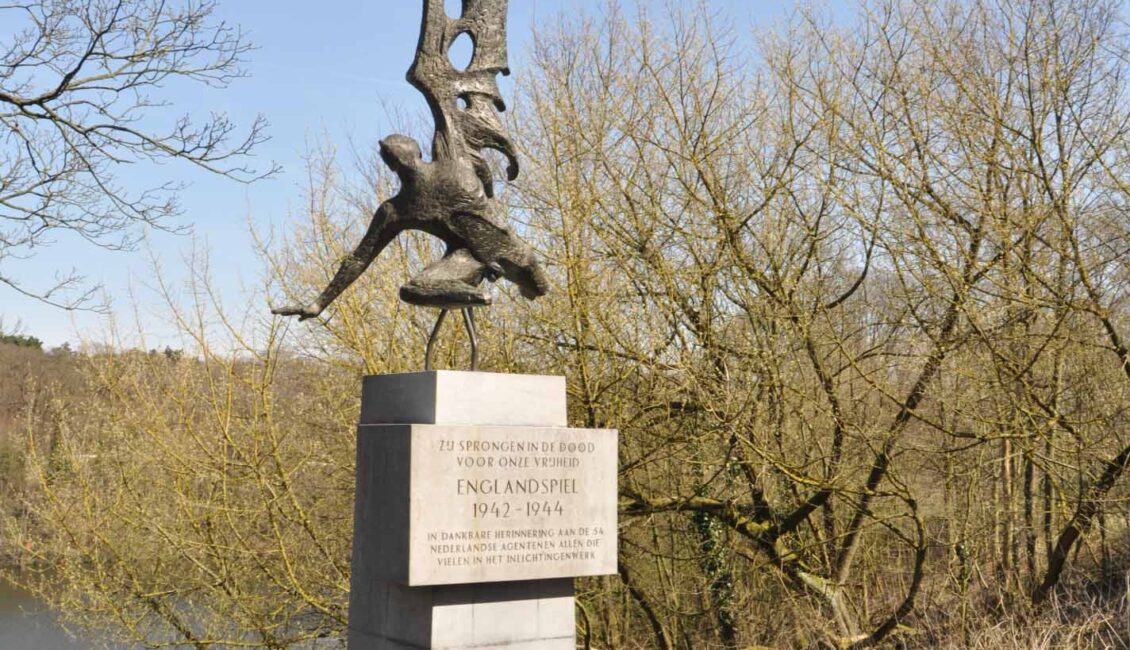
Monument Englandspiel Hogeweg
Artist: Titus Leeser (1903-1996)
Unveiled on May 3, 1980 by Princess Juliana
On the edge of the Scheveningen woods, in the Van Stolkpark on the southwest side of the water, you will find the monument that commemorates the 54 fallen of the Englandspiel. The location was chosen because of the white house that stands right behind the monument on the Hogeweg. During the Second World War, the Sicherheitsdienst was located in this house. The victims of the Englandspiel were interrogated here, among other places.On the edge of the Scheveningen woods, in the Van Stolkpark on the southwest side of the water, you will find the monument that commemorates the 54 fallen of the Englandspiel. The location was chosen because of the white house that stands right behind the monument on the Hogeweg. During the Second World War, the Sicherheitsdienst was located in this house. The victims of the Englandspiel were interrogated here, among other places.
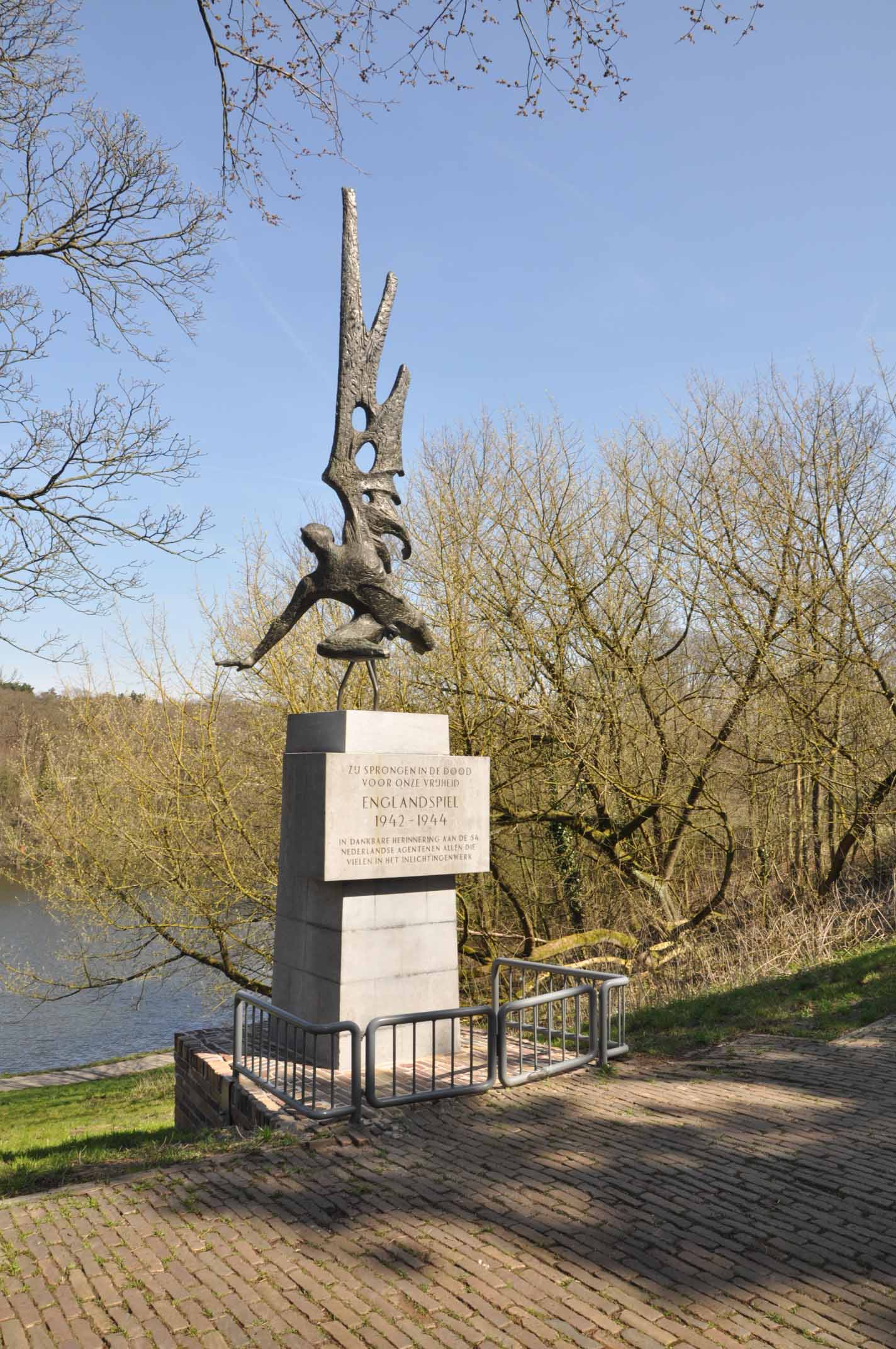
The monument was made by sculptor Titus Leeser. Leeser made several works in memory of the war and its victims, such as the War Monument in Zwolle and the Provincial Resistance Monument Overijssel. Princess Juliana unveiled the monument on 3 May 1980.
The monument consists of a pedestal with a statue of an angel with burnt wings and is entitled ‘The Fall of Icarus.’ The statue symbolically refers to the Dutch secret agents who jumped from the air directly into the hands of the Germans and their subsequent death. A plaque is attached to the pedestal with the following text:
THEY JUMPED TO THEIR DEATH FOR OUR FREEDOM
ENGLANDSPIEL 1942 – 1944
In grateful memory of the 54 Dutch agents and all those who fell in intelligence work.
There is also a plaque in the Binnenhof with the same text supplemented with the sentence: “many of them were taken into this building while they were captured.
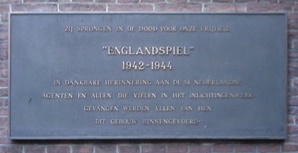
This plaque commemorates the interrogations that took place in the buildings of the Binnenhof.
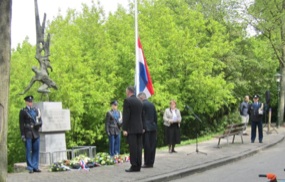
The text that is presented:
The Englandspiel was a radio contact between the English secret service and the German counter-intelligence service, the Abwehr, between 1942 and 1944.
Early after the Dutch capitulation, resistance groups in the Netherlands gathered information that was difficult to send to England without radio. Agents were dropped from England onto Dutch occupied territory to signal these messages to the British secret service.
Agent Huub Lauwers, who had been dropped for this purpose, sent his first code message to the United Kingdom on 3 January 1942. On 6 March he was arrested in The Hague. As he had been taught in England, he initially refused to cooperate with the Germans. He did so after lengthy interrogations because this would enable him to inform the British secret service of the fact that he had been arrested.
During his training he had been taught to make a deliberate mistake in his Morse telegrams – the so-called security check – and to leave it out as soon as he was arrested. The Abwehr did not have this individual security check. On 8 March he sent a message to London. Although he left out his security check, London took no action. This was the beginning of the Englandspiel.
Voor de Duitsers was dit een uitgelezen kans om meer uit Engeland afkomstige Nederlandse agenten in handen te krijgen en de Engelsen misleidende inlichtingen te verstrekken.
During the period 1942–1944, 54 agents were arrested and put to death by the Germans as part of the Englandspiel.
We remember with great respect the young people who risked their lives because they believed it was their duty to help liberate their homeland from the Nazi occupiers. They were prepared to make the ultimate sacrifice. They became defenseless prey to this dirty game between the secret services of Germany and England and were put to death by the Nazis in a gruesome manner.
We still do not know for certain whether they were victims of treachery, of a double game or of simple stupidity. But we remember with respect all those who fell victim to this Englandspiel and we will continue to do so as long as it is in our power.
We do this at this beautiful monument at this location, which also commemorates the interrogations of the victims in the building of the Sicherheitsdienst, the service that worked with the Abwehr and was housed in that white villa on the other side of the road.
Footage from previous commemorations:
https://www.youtube.com/watch?v=afj41rd3NYk
https://www.youtube.com/watch?v=kgxHOQVA4uQ
The England Game
The Englandspiel (also called Operation Nordpol or Operation Pol Nord by the German counterintelligence service Abwehr) was a German operation that took place between 1942 and 1944. During this operation, 59 Dutch secret agents were captured. These Dutch agents had been trained as secret agents in the United Kingdom and were dropped in the Netherlands by the SOE (Special Operations Executive) to send coded information to the United Kingdom via a transmitter network. By capturing the agents, the Germans were able to provide the British with false information via the transmitter network.
For a long time it was assumed that the SOE did not know that the agents had been captured and that they were being provided with false information by the Germans. The SOE continued to drop secret agents over Dutch territory for a long time. But in recent years more and more indications have emerged that the SOE was indeed aware of this and deliberately continued to drop agents, knowing that they would fall into the hands of the Germans. One explanation for this is that the United Kingdom was also able to provide the Germans with false information in this way. They wanted to make the Germans believe that the invasion of the Allies would take place in the Netherlands. In that case, the Englandspiel can be seen as a kind of diversionary manoeuvre by the SOE in which the secret agents were deliberately sacrificed; the British often made the exact location where the agents would be dropped known, and the agents were immediately arrested by the Germans after being dropped. The Englandspiel could therefore have been a deception tactic by both the Germans and the English; a double game in which the Dutch secret agents were the stake. However, there are only indications for this. There is no certainty about this (yet).
The majority of the captured agents were initially imprisoned in Camp Haaren in North Brabant. A few managed to escape, including Ben Ubbink and Pieter Dourlein (31 August 1943). Via a detour via Switzerland and Spain, they eventually managed to reach England, where they warned the British that the entire Dutch transmitter network was in the hands of the Germans. However, they were initially arrested by the British on suspicion of counter-espionage: the British had received false information from the Germans about the intentions of Ubbink and Dourlein.
By late 1943 and early 1944, the Germans realized that their plan for the operation had been seen through. They were not given any new locations of agents to be dropped. On April 1, 1944, the Englandspiel came to an end with the following cynical message from the German side:
Messrs, Blunt, Bingham and successors, Ltd. London. Of late you have been trying to do business in Holland without our help. We feel this is unfair in view of our long and successful association as your exclusive agents. But should you nevertheless visit the Continent you may be sure of receiving the same care and treatment as those who sent you before have received. Good-bye! (freely translated)
The majority of the captured agents were then transferred to the Mauthausen concentration camp in Austria. They were executed in this camp between 6 and 8 September 1944. In total, 54 Dutch secret agents met their death during the Englandspiel. Only five of the captured agents survived the “game”.
The Remembrance
Every year on May 4 at 3:00 PM a commemoration is held at the monument.
